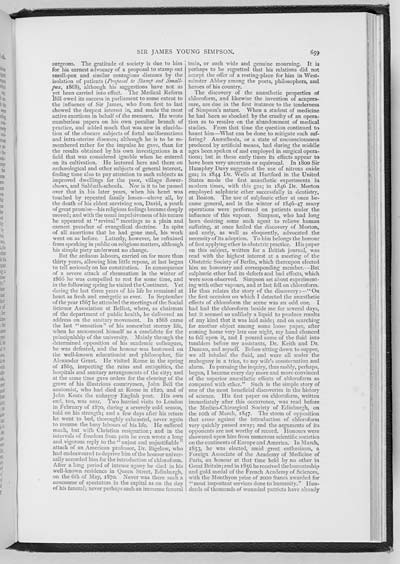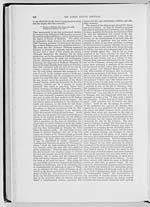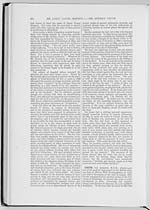Volume 3 > Half-Volume 6
(305) Page 659
Download files
Individual page:
Thumbnail gallery: Grid view | List view

659 surgeons. The gratitude of society is due to him j for his earnest advocacy of a proposal to stamp out ' small-pox and similar contagious diseases by the isolation of patients (Proposal to Stamp out Small- pox, 1868), although his suggestions have not as yet been carried into effect. The Medical Reform Bill owed its success in parliament to some extent to the influence of Sir James, who from first to last showed the deepest interest in, and made the most active exertions in behalf of the measure. He wrote numberless papers on his own peculiar branch of practice, and added much that was new in elucida- tion of the obscure subjects of fetal malformations and intra-uterine diseases; although he is to be re- membered rather for the impulse he gave, than for the results obtained by his own investigations in a field that was considered ignoble when he entered on its cultivation. He lectured here and there on archaeological and other subjects of general interest, �finding time also to pay attention to such subjects as improved dwellings for the poor, village flower- shows, and Sabbath-schools. Nor is it to be passed over that in his later years, when his heart was touched by repeated family losses�above all, by the death of his eldest surviving son, David, a youth of great promise�his religious feelings became deeply moved; and with the usual impulsiveness of his nature he appeared at "revival" meetings as a plain and earnest preacher of evangelical doctrine. In spite of all assertions that he had gone mad, his work went on as before. Latterly, however, he refrained from speaking in public on religious matters, although his simple piety underwent no change. But the arduous labours, carried on for more than thirty years, allowing him little repose, at last began to tell seriously on his constitution. In consequence of a severe attack of rheumatism in the winter of 1866 he was compelled to rest for some time, and in the following spring he visited the Continent. Yet during the last three years of his life he remained at heart as fresh and energetic as ever. In September of the year 1867 he attended the meetings of the Social Science Association at Belfast, where, as chairman of the department of public health, he delivered an address on the sanitary movement. In 1868 came the last "sensation" of his somewhat stormy life, when he announced himself as a candidate for the principalship of the university. Mainly through the determined opposition of his academic colleagues, he was defeated, and the honour was bestowed on the well-known educationist and philosopher, Sir Alexander Grant. He visited Rome in the spring of 1869, inspecting the ruins and antiquities, the hospitals and sanitary arrangements of the city; and at the same time gave orders for the clearing of the grave of his illustrious countrymen, John Bell the anatomist, who had died at Rome in 1820, and of John Keats the unhappy English poet. His own end, too, was near. Two hurried visits to London in February of 1870, during a severely cold season, told on his strength; and a few days after his return he went to bed, thoroughly exhausted, never again to resume the busy labours of his life. He suffered much, but with Christian resignation; and in the intervals of freedom from pain he even wrote a long and vigorous reply to the "unjust and unjustifiable" attack of an American professor, Dr. Bigelow, who had endeavoured to deprive him of the honour univer- sally accorded him for the introduction of chloroform. After a long period of intense agony he died in his well-known residence in Queen Street, Edinburgh, on the 6th of May, 1870. Never was there such a concourse of spectators in the capital as on the day of his funeral; never perhaps such an immense funeral train, or such wide and genuine mourning. It is perhaps to be regretted that his relations did not accept the offer of a resting-place for him in West- minster Abbey among the poets, philosophers, and heroes of his country. The discovery of the anaesthetic properties of chloroform, and likewise the invention of acupres- sure, are due in the first instance to the tenderness of Simpson's nature. When a student of medicine he had been so shocked by the cruelty of an opera- tion as to resolve on the abandonment of medical studies. From that time the question continued to haunt him�What can be done to mitigate such suf- fering? Anaesthesia, or a state of unconsciousness produced by artificial means, had during the middle ages been spoken of and employed in surgical opera- tions; but in these early times its effects appear to have been very uncertain or equivocal. In 1800 Sir Humphry Davy suggested the use of nitrous oxide gas; in 1844 Dr. Wells at Hartford in the United States made the first anaesthetic experiments in modern times, with this gas; in 1846 Dr. Morton employed sulphuric ether successfully in dentistry, at Boston. The use of sulphuric ether at once be- came general, and in the winter of 1846-47 many operations were performed on patients under the influence of this vapour. Simpson, who had long been desiring some such agent to relieve human suffering, at once hailed the discovery of Morton, and early, as well as eloquently, advocated the necessity of its adoption. To him belongs the honour of first applying ether in obstetric practice. His paper on this subject, written for a British journal, was read with the highest interest at a meeting of the Obstetric Society of Berlin, which thereupon elected him an honorary and corresponding member.�But sulphuric ether had its defects and bad effects, which were soon observed. Simpson set about experiment- ing with other vapours, and at last fell on chloroform. He thus relates the story of the discovery:�"On the first occasion on which I detected the anaesthetic effects of chloroform the scene was an odd one. I had had the chloroform beside me for several days, but it seemed so unlikely a liquid to produce results of any kind that it was laid aside; and on searching for another object among some loose paper, after coming home very late one night, my hand chanced to fall upon it, and I poured some of the fluid into tumblers before my assistants, Dr. Keith and Dr. Duncan, and myself. Before sitting down to supper, we all inhaled the fluid, and were all under the mahogany in a trice, to my wife's consternation and alarm. In pursuing the inquiry, thus rashly, perhaps, begun, I became every day more and more convinced of the superior anaesthetic effects of chloroform as compared with ether." Such is the simple story of one of the most beneficial discoveries in the history of science. His first paper on chloroform, written immediately after this occurrence, was read before the Medico-Chirurgical Society of Edinburgh, on the 10th of March, 1847. The storm of opposition that arose against the introduction of chloroform very quickly passed away; and the arguments of its opponents are not worthy of record. Honours were showered upon him from numerous scientific societies on the continents of Europe and America. In March, 1853, he was elected, amid great enthusiasm, a Foreign Associate of the Academy of Medicine of Paris, an honour at that time held by no other in Great Britain; and in 1856 hereceived thelaureateship and gold medal of the French Academy of Sciences, with the Monthyon prize of 2000 francs awarded for '' most important services done to humanity." Hun- dreds of thousands of wounded patriots have already
Set display mode to:
![]() Universal Viewer |
Universal Viewer | ![]() Mirador |
Large image | Transcription
Mirador |
Large image | Transcription
Images and transcriptions on this page, including medium image downloads, may be used under the Creative Commons Attribution 4.0 International Licence unless otherwise stated. ![]()
| Biographical dictionary of eminent Scotsmen > Volume 3 > Half-Volume 6 > (305) Page 659 |
|---|
| Permanent URL | https://digital.nls.uk/74514884 |
|---|---|
| Attribution and copyright: |
|
| Description | Volume III. Contains names alphabetically from Macadam to Young. |
|---|

